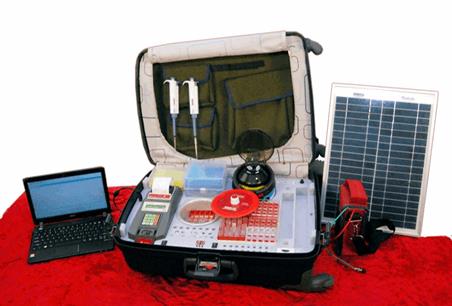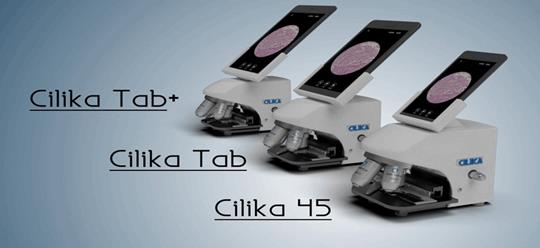Medtech Innovations For Diagnostics In India
By Gunjan Bagla, Amritt Ventures
 Before you can treat a disease, you need to know it exists in a patient. Across the developing world, diagnosis is a major challenge, with hundreds of millions of patients being missed by the healthcare systems due to poor access, high costs, or lack of skilled staff. This article looks at four companies from India that have approached this problem from radically different angles — with impressive results.
Before you can treat a disease, you need to know it exists in a patient. Across the developing world, diagnosis is a major challenge, with hundreds of millions of patients being missed by the healthcare systems due to poor access, high costs, or lack of skilled staff. This article looks at four companies from India that have approached this problem from radically different angles — with impressive results.
Catching Breast Cancer Early
One of four Indian startups selected for the 2018 Google Launchpad Accelerator mentorship program, Niramai Health Analytix uses artificial intelligence to detect early signs of breast cancer. The Bangalore-based company has received funding from 500 Startups, Ankur Capital, Axilor Ventures, pi Ventures, and Flipkart co-founder Binny Bansal.
Founders Dr. Geetha Manjunath, a Ph.D. in computer science with research experience at Hewlett Packard and Xerox, and Nidhi Mathur, an MBA from the Indian Institute of Management (Bangalore) who also spent time at Xerox, wanted to create a low cost, accurate, automated, portable cancer screening tool. The result was NIRAMAI, an acronym for Non-Invasive Risk Assessment with Machine Intelligence; in the ancient Indian language of Sanskrit the word means ‘being free from illness.’
In 2016, Manjunath and her team developed an AI-led diagnostic platform that uses patented thermal image processing and machine learning algorithms for reliable and accurate breast cancer screening. The platform can detect tumors years before mammography or a clinical exam can. The portable screening tool, called SMILE, has been tested on data from 300 patients, and results indicate an accuracy comparable to currently available diagnostics. The AI and ML algorithms for the analysis of thermal images have resulted in two U.S. patents granted, as well as many more patent applications.
"Our method of breast cancer screening can detect tumors five times smaller than what clinical exams can detect, is painless, non-contact, and free of any radiation, apart from being low-cost and universally accessible. With our solution, women of all age groups can undergo frequent screening without any side effects," says Niramai.
Laboratory On The Go
Accuster Technologies, located in India’s national capital region of Delhi, has created a portable, battery operated medical laboratory in a suitcase. The company has sold over 1,500 of these labs for use in rural and remote locations. The system packages a biochemistry analyzer, a centrifuge, a data recorder, and a laptop with patient data management software. The lab operator can perform thirty-six tests — for example, liver and kidney function tests, blood sample analyses, and creation of a patient’s lipid profile. Indian media reports that the tests are being offered for 250 rupees (under $5).

CEO Amit Bhatnagar, who earned an M.S. in bio-engineering from Penn State University before starting the company in 2008, worked with a small team to develop the product over three years before establishing a factory in 2011. “Innovation that matters has been the prime driving force. Our efforts focus not only on growing the business, but on the larger impact created in society also. This is what gives us a sense of fulfillment,” says Bhatnagar.
Smartphone-Enabled Microscope
India’s most populous city, Mumbai (formerly Bombay) is home to a startup that hopes to launch a series of product lines. Born at the incubator located at the Indian Institute of Technology (IIT) Bombay, MedPrime Technologies lists among its innovations a microscope for clinical and research applications.
Cilika Tab is a portable pathology grade microscope that offers the entire circular view, as observed through the eyepiece, rather than the limited slice offered in other products. It is equipped with high-precision optics and offers the capability to magnify an object optically up to 1,500 times. The digital zoom function enables a further 4X boost, for an effective spot magnification of 6,000X. The compact optical subsystem is connected to a conventional smartphone for flexibility and portability.

Samrat Swami is one of the four co-founders of MedPrime, who met partners Binil Jacob, Mahesh Rathod and Greeshma Unnikrishnan while he was pursuing a master’s degree at IIT Bombay.The company has received limited funding from the Society for Innovation and Entrepreneurship, an incubator at IIT Bombay, as well as from family. Regarding marketing plans, Samrat said the company will focus on pathology labs, hospitals, medical colleges, government healthcare institutions, and research institutes within India for the first three years. “From year four, we will explore other countries in the Indian subcontinent, Africa, and Middle East,” he explained.
Remote Radiology
About 100 miles from Mumbai, Pune-based Medsynaptic boasts the largest number of tele-radiology users in India. The company has evolved from developing a tele-radiology solution — to enable the quick transfer of images over telephone lines in rural areas where the internet is slow or unavailable — to high-end web-based teleradiology that can be accessed from anywhere in the world.
The point-to-point teleradiology solution devised by Medsynaptic consists of a sending station with a dicom receiver and a remote receiving station at the reporting end. Designed for typical Indian conditions, the device does not require a static IP address, sending and receiving stations need not be online at the same time, and patients’ data can be stored.
Founder and CEO Dr. Ashish Dhawad, is a physician with postgraduate credentials in bioinformatics & medical informatics from University of Pune. He shared his thoughts with us on an email exchange: “In the early 2000s, digital imaging equipment was getting installed in smaller towns across India. The availability of radiologists in such locations was scarce. The total number of radiologists in the country was sparse, and they preferred residing in large urban centers,” said Dr.Dhawad via an email interview. “There was a clear need for a software solution which could connect remote imaging equipment with competent radiologists and provide 24x7 reporting, even for emergency scans. The company currently exports to countries across Asia, Middle East, Africa, and Latin America.”
What’s next?
Venture capital from domestic and foreign sources, non-profits such as the Bill and Melinda Gates Foundation, and incubators such as the one at IIT Bombay are providing seed and growth capital to feed increasingly emboldened Indian entrepreneurs. Some, like the founders of MedPrime, are starting companies right out of college; others, such as the founders of Niramai, are leaving prized jobs at top global multinationals, where they have learned western practices and global standards. The medical device revolution in India will impact the world and it has barely begun.
About The Author
Based in Los Angeles, Gunjan Bagla is managing director of Amritt Inc., a California-based consulting firm focused on helping American companies to succeed in India. His clients include Covidien, Roche Diagnostics, BD, Nordic Naturals, Johnson & Johnson, Gojo, and many more. Gunjan spoke at the 2017 MD&M West Conference and was on the keynote panels at MEDevice San Diego, as well as IMDI in Ahmedabad, India. For his India expertise, he has appeared in The New York Times, the Los Angeles Times, and the Washington Post, as well as on Bloomberg TV, BBC Television, and Fox Business News. He also writes about India for the Harvard Business Review and the Huffington Post. Gunjan has an MBA from Southern Illinois University and a mechanical engineering degree from the Indian Institute of Technology (IIT) Kanpur in India.
